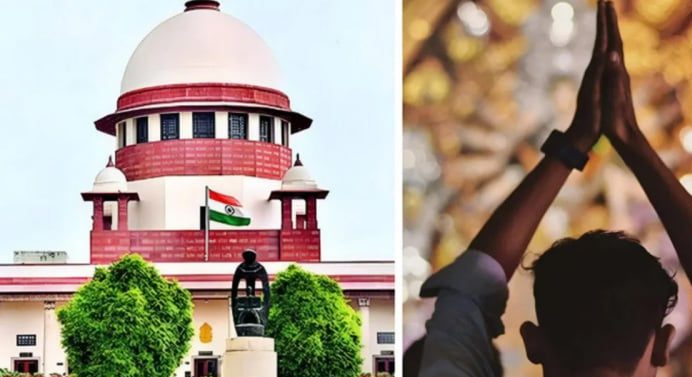The Supreme Court on Thursday heard petitions challenging the constitutionality of the Places of Worship Act, 1991. During the hearing of the case, the CJI said that the matter is completely legal. Until we hear and dispose of the case, no further case can be filed.
Hearing is going on in the Supreme Court on the Places of Worship Act 1991. The constitutional validity of the Act was challenged in the petition. The hearing of this case is going on in the bench of three judges including Chief Justice Sanjeev Khanna. During the hearing of the case, the CJI said that the matter is completely legal. No further case can be filed until we hear and dispose of the case. We also have the Ramjanmabhoomi issue.
- CJI said that the matter is completely legal. Until we hear and dispose of the case, no further case can be filed. We also have the Ramjanmabhoomi issue. The CJI said that whatever cases have been registered will continue. Senior lawyer Raju Ramachandran said that whatever cases are going on. There is a need to stop the action for now. Survey orders are being given. CJI said how many such cases are pending? I am aware of two cases, one from Mathura and the other. The SG asked whether a stranger, who is not a party to the case, could come and say that all proceedings should be stopped. that is the question.
- A bench headed by CJI Sanjiv Khanna is hearing petitions challenging the constitutional validity of the Places of Worship Act, 1991. The petition demands repeal of Sections 2, 3 and 4 of the Places of Worship Act, 1991. CJI Sanjeev Khanna said that no one will speak without asking us. The Center will have to file an affidavit. SG Tushar Mehta said that yes, we need it. The CJI said please file the reply and serve it to the petitioners and respondents. Supporters can view the answers after you upload the e-copy on the internet.
Hearing has started in the Supreme Court on the Places of Worship Act 1991
The relevant law states that the religious nature of places of worship existing on August 15, 1947, will remain the same as it was on that day. It prohibits filing a suit to reclaim any religious site or alter its character.
Many petitions are pending in the Supreme Court in this regard, one of which has been filed by Ashwini Upadhyay. He has requested to repeal sections two, three and four of the Places of Worship (Special Provisions) Act, 1991. One of the arguments in the petition is that these provisions take away the right of any individual or religious group to seek judicial redress to reclaim a place of worship.
What was the logic?
Marxist Communist Party and Maharashtra MLA Jitendra Satish Awad have also filed petitions against several pending petitions challenging the constitutional validity of the Places of Worship Act, 1991, saying the law is a threat to public order, brotherhood, unity and secularism. Puts safety at risk.
The hearing of the case will take place in the backdrop of several cases filed in various courts, including those related to the Gyanvapi Mosque in Varanasi, the Shahi Idgah Mosque in Mathura and the Shahi Jama Masjid in Sambhal. In these cases it has been claimed that these places were built after destroying ancient temples and it has been requested that Hindus be allowed to worship there.
In most of these cases, the Muslim side has cited the 1991 law and argued that such cases are not acceptable. Six petitions have been filed against the provisions of the Act, including one filed by former Rajya Sabha member Subramanian Swamy. While Swamy wants the Supreme Court to reinterpret certain provisions so that he can sue the Gyanvapi Mosque in Varanasi and the Shahi Idgah Mosque in Mathura, Upadhyay claimed that the entire law is unconstitutional and there is no point in reconsidering the interpretation it comes up with. No need.
